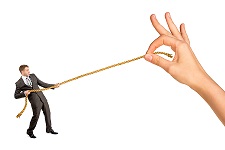

Pinocchio told lies, and his nose grew. Unfortunately, liars in the courtroom may only be caught out by the inconsistent statements they make throughout a case. The challenge is for the jury and prosecution to find out the truth, the whole truth and nothing but the truth. The prospect of success in a court case is dependent upon the judge and jury believing the story put forward by the prosecution, beyond a reasonable doubt. To reach this decision, the jury must not doubt that the accused is guilty or not guilty. A combination of the defendant’s explanation of events along with any witnesses available to testify is then put forward in front of the court for them to reach a conclusive decision as to whether the defendant is accountable.
Legality of Contradictory Statements
In legal terms, a contradictory statement is an incompatibility and clear opposition to two ideas which are the subject of the same proposition. Whether it be the defendant on the stand accused of a crime, providing insufficient information to what has been previously provided or if one or more witnesses reenact the chain of events that occurred, but do not portray a mirrored story, contradictory statements lead to much confusion for the judge and jury. When a statement made has been contradicted by another in court, the jury is led to believe that all accounts made from that point onwards are false. Any evidence that would seem credible is now unreliable. A contradictory statement made in court signifies that the person making such statement has been untruthful at some point during their account.
It is a public perception that perjury is a hard crime to prove. In most US jurisdictions, the two-witness rule is used to discover whether the accused has committed such a crime. Under the two-witness rule, it must be proven that the defendant’s statements made would be contradicted by at least two witnesses. As above mentioned, the difficulty of proving a defendant has committed perjury amounts from the fact that at common law the accused cannot be convicted of perjury based only on a contradictory statement made unless it is then established by the prosecution that either of the statements made which contradict one another is false. With evidence and witness statements, once the above is proven, a successful prosecution of perjury can be brought against a person.
The laws in place among global jurisdictions highlight the importance of witnesses, and the accused told the truth under oath in court. It is understandable for a witness that attending court is a daunting experience. The directions given by the court is to make sure that the process for a witness is as comfortable and safe as possible.
Within court proceedings, it has not been unknown for witnesses to contradict what was originally recorded in their witness statements. As time has elapsed since the statement was written, witnesses have had the opportunity to recollect on the events they saw and question whether what they noted shown the accurate picture. The process of a witness providing the court with their account of the facts first starts with the witness documenting and signing the statement of truth to confirm what they have recorded are to their knowledge the true, accurate events that took place. If a witness is called to the stand and contradicts a statement previously made by themselves or another witness with a similar account, the testimony given is weak, leading the jury to discredit all that they have heard up to this point which may have damaging effects for the defense or prosecution.
A contradictory statement can result in the accused being convicted of a crime they may not have committed. In the case of E v Joyce, several witnesses had identified the defendant through detailed statements and confirmed they had the correct identity of the person they saw. At the trial, the witnesses stated that they were now not certain whether their identification was correct. The trial judge admitted the earlier statements as evidence of the first identification being the accused. With this, the jury convicted the accused.
Witness Testimony

The strength of a witness’s statement is paramount to win the case. A contradictory comment, regardless of the effect it may have on proving the defendant’s guilt, will be noted. The single purpose of cross-examination is not only to get the truth from the accused or witnesses but to decipher statements that align, against those that appear suspicious and do not match up with other evidence available to that case. It cannot be concluded that in every instance of a contradictory statement that the witnesses or the accused is lying. Taking into consideration the complexity of each case, certain questions put forward by the defense and prosecution during cross-examination will be heard or construed differently by the person on the stand under oath.
A witness is at a greater disadvantage to the lawyer as they approach the stand. The witnesses are not aware of documents they cross-examiner may have which directly impacts on the statement they presented. There is no preparation given to a witness. A statement is made and signed and read out again by the witness in front of the court. It is necessary that witnesses are given recognition for their ability to show their account, regardless of whether they contradict a certain event happening. In these situations, however, the opposing side take it upon themselves to highlight any contradictory statement made regardless of the sincerity behind it, to induce the jury to see that a witness is lying, therefore, their story so far is imperfect.
The defendant enters the court followed by the misconception by the jury that they are guilty of the crime before they are given the opportunity to defend themselves. Straight contradiction implies to the court that when the accused speaks falsely about a certain point, they are speaking falsely about all points they have raised. Implications arise here as it could be perceived by the jury that the accused is self-incriminating themselves by contradicting earlier statements. Irrespective of whether the story matches other evidence presented and highlights to the jury that the defendant is innocent, a contradictory statement prompts negative reviews from the jury about that person’s ability to tell the truth, the whole truth and nothing but the truth .
Self-contradiction can be brought out by the skills used in cross-examination or from the accused’s statements previously made. Statements and evidence used against the defendant create panic and can result in them then self-contradicting points they have made to explain or justify why whatever has been presented does match. As abovementioned throughout the article, contradictory statements signify to the jury who is possibly telling the truth and who is lying allowing them to reach a valid conclusion based on what they have heard on whether the accused is guilty or not.
It seems that a contradictory statement can easily be made in court and will damage the credibility of the information put forward by the accused or the witnesses. Unfortunately, the jury does not take these statements lightly which may result in serious impacts to the case. As abovementioned in the legal definition of a contradictory statement, the information provided by the defendant or witnesses must be inconsistent with previous. The wording of inconsistent rather the use of different provides uncertainty as a mere mistake made of such an exact time something happened or the exact coloring of clothing the defendant was wearing may only be slightly variable to what evidence or other statements display.